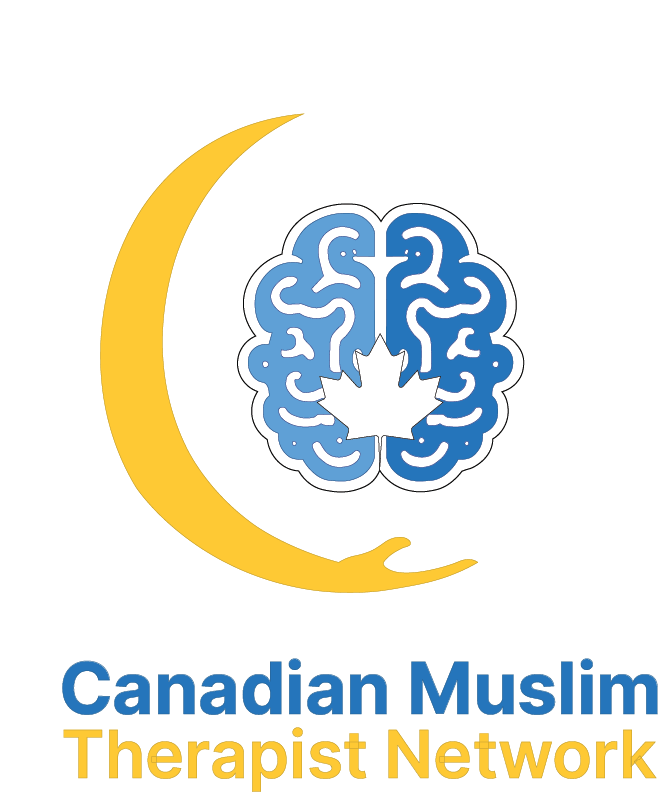Why we started this
Working in private practices, three therapists longed for a sense of belonging to their clinical community and religious affiliation. We recognized an emerging need for a platform that would unites Muslim mental health therapists with similar experiences, clinical trainings, ethical practices, and interest to deliver evidence-based interventions. In 2022, we formed our initial peer consultation group and found it incredibly meaningful and effective! In 2023, we decided to expand this initiative Canada wide.


What we aim to do
The Canadian Muslim Therapist Network aims to provide a platform to support clients through their therapeutic journey with an Islam-informed and Islam-integrated approaches. In an effort to de-stigmatize mental health in the Muslim community and unite Muslim therapists, we hope to create a centralized client and therapist referral system. As well, offer opportunities for collaboration, knowledge sharing, professional development and networking
Meet Our Volunteer Team
Nisha Damani
Afreen Chowdhury
Kulsum Khan
Kashfia Iqbal
Sarah Bashir
Rabeea Siddique
I am unemployed/low-income/student/retired, do Therapists offer a reduced fee?
Yes! Some of our therapists on our directory offer a reduced fee or a sliding-scale upon request. The spots may be limited, please inquire with your respective therapist.
What are the membership options?
- Three membership options:
Canadian Muslim Therapist Directory membership (Annual contract). - Canadian Muslim Therapist Directory membership (Annual contract) + Peer Supervision (Monthly contract).
- Canadian Muslim Therapist Directory membership (Annual contract) + Peer Supervision (Annual contract).
Can I still join peer supervision meetings without a membership?
At this time, our peer supervision meetings are for registered members only. This allows us to maintain ethical, confidential, and consensual practice.
Do I have to be Muslim Therapist to access these membership services?
Yes, the membership services are for Muslim-identifying persons.
Are there Muslim Therapists who work with gender and/or sexual identity?
We invite you to please browse through our directory to find the therapist that best fit your needs.
How do I get my profile on the Therapist Directory?
Once your membership has been processed, the profile provided by you during the application process will be uploaded to our website.
As a client, do I need a membership to use or browse the therapist directory?
No! The therapist directory is free for clients to browse and contact any therapist they want to work with.
What is the different between a Counsellor, Therapist, Psychotherapist, Social Worker, Psychologist, and Psychiatrist?
Therapist
The term "therapist" is a broad and generic title that can be used to refer to various professionals who provide therapeutic services to individuals, couples, families, or groups. Therapists work in the field of mental health and wellness, addressing a wide range of emotional, behavioral, and psychological issues. The specific title or designation of a therapist can vary based on their educational background, training, and the type of therapeutic services they offer. Some common types of therapists are social workers, psychotherapists. psychiatrists and psychologists.
Psychotherapist
A psychotherapist utilizes talk-based methods to help individuals address emotional, psychological, or behavioral challenges, as well as to promote personal development, well-being, and improved mental health. The term "psychotherapist" is not a protected title in all provinces, and practitioners may have diverse educational backgrounds. Psychotherapists in Canada may hold degrees in psychology, social work, counseling, or related fields, and they work to improve mental health and well-being through various therapeutic approaches such as cognitive-behavioral therapy (CBT), psychodynamic therapy, and others, tailored to the individual needs of their clients. Regulation and licensing for psychotherapists can vary by province.
Counselor
A counselor typically holds a master's degree in counseling or a related field. They provide counseling services to help individuals cope with life challenges, manage stress, and address mental health issues. Counselors may have specific specializations, and the profession may be regulated in some regions. The terms "therapist" and "counselor" are often used interchangeably, and the distinction between them can vary based on regional and professional differences. In many cases, both therapists and counselors provide similar services.
Social Worker
A social worker holds a degree in social work such as a Master in Social Work and is trained to address social, emotional, and behavioral issues impacting individuals, families, and communities. Social workers can also utilize talk-based methods to help individuals address emotional, psychological, or behavioral challenges, as well as to promote personal development, well-being, and improved mental health. The practice of social work is regulated in most provinces, and social workers adhere to ethical standards while promoting social justice and empowerment.
Psychologists
A Psychologists typically hold a doctoral degree (Ph.D. or Psy.D.) in psychology. Some provinces may also recognize psychologists with a master's degree (M.A. or M.Sc.) in psychology, but a doctoral degree is often preferred. Psychologists provide a wide range of services, including psychological assessment, diagnosis, and various forms of psychotherapy or counseling. Psychologists primarily use psychotherapy or talk therapy to help individuals manage and overcome mental health issues.
Psychiatrist
A psychiatrist is a medical doctor who has completed medical school and specialized in psychiatry during their residency. They are trained in both general medicine and psychiatry, which allows them to diagnose and treat mental health disorders from a medical perspective as well as prescribe and adjust medications. They may also provide psychotherapy as part of their practice.
As a therapist, do I have to have my own private practice to be a member?
All types of therapists practicing in various settings such as community centres, schools, hospitals, private clinics, etc. across Canada are welcome! We thrive on diversity!
As a licensed therapist, do I need to provide proof of registration/licensing every year?
CMTN only requires proof of registration/license during the initial membership registration. It is the therapists responsibility to maintain their registration/license for the following years.
*If your license is suspended or revoked, please inform CMTN immediately.
As a client, what do I do if I have a concern or a complaint with my therapist? Can CMTN support me with this matter?
Your feedback is always appreciated and important. We ask that you connect with your respective therapist to discuss the feedback directly with them.
If you are interested in connecting with a different therapist, please browse through our directory again. We understand the value and benefit of the client-therapist professional relationship. Finding the best fit with a therapist takes time!
CMTN is here to connect clients with Muslim therapists, however CMTN is not responsible for the private clinical work that occurs between and therapist and client. The therapists registered in our directory operate as their own entity and business.
If your concern involves professional misconduct, sexual harassment, violence, abuse, or anything else if this nature, please contact the licensing board of that therapist for further advise.













